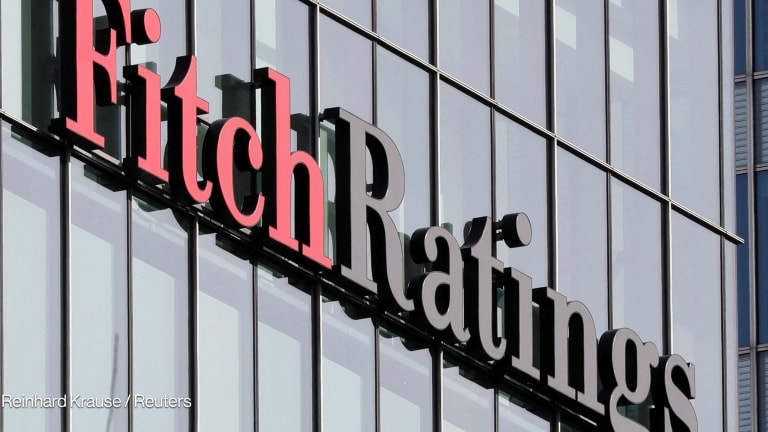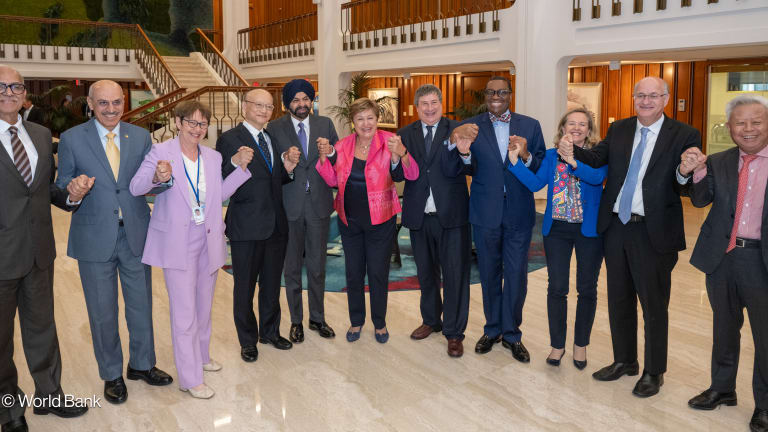Call me, maybe? How callable capital can increase development lending
There's nearly $2 trillion in callable capital out there. Can it be used to get more development finance out to countries in need? And why is it called callable capital? We use the hit song "Call me, maybe" to explain.
Was the 2011 hit song by Carly Rae Jepsen “Call Me Maybe” written about development finance? It’s unlikely, but here at Devex we can’t help but see the connection — especially in this key moment for multilateral development banks, with a giant push underway to reform them so that they can get more money to countries in need in this era of multiple overlapping crises. Still, you’ll soon have the hit tune stuck in your head, and, we promise, a deeper understanding of the neglected but important issue of callable capital, which helps stabilize the entire development finance system. Callable capital also underpins a landmark report to the Group of 20 earlier this year which laid out a plan for increasing MDB lending by hundreds of billions of dollars. First things first. What is callable capital? First, we should consider what types of capital the banks have. The most tangible money shareholders have made available to the banks is “paid-in capital.” This is the money countries have given to the anti-poverty lenders so they can lend to lower-income nations. At the main wing of the World Bank, the biggest of the multilateral banks, paid-in capital amounts to about $20 billion, and it forms the basis for all lending. The bank leverages this money by borrowing on markets, allowing it to lend some $230 billion to countries. Callable capital, meanwhile, is pretty unique to the MDB system. It is money that shareholders have pledged but not delivered, and it acts as an absolute last-stop guarantee in the event of a catastrophe, such as an economic collapse where borrowers can’t repay the banks. With callable capital, shareholders are indirectly telling MDB bond holders: “Don’t worry. Even if the banks cannot pay you back, we will.” This money, which helps support the banks’ high credit ratings, is vastly greater than the paid-in capital. The credit ratings agency Fitch Ratings says that while paid-in capital across the 20 development banks it rates is worth about $220 billion, callable capital is almost 10 times that, at nearly $2 trillion — and never has callable capital been used. That’s why the G-20 report had high hopes that banks could lend hundreds of billions more. A bit of recent history Momentum for MDB reform kicked off earlier this year with the G-20 report, in which a group of experts laid out a plan for additional lending without hurting the banks’ prized AAA and AA credit ratings. High ratings are fundamental to banks’ business model: they can borrow cheaply on capital markets and pass on those savings to low-income countries because they have excellent creditworthiness. The World Bank is due to submit a first road map for its overhaul plans to shareholders around Christmas, as it faces pressure from shareholders including the United States and Germany to find more funds, especially for climate finance. We should then expect to see a collective action plan for reform from all the major MDBs at the World Bank Spring Meetings in April. For international institutions, this is moving pretty quickly. The G-20 report presented five pillars for reform, and a major one relied on using callable capital. But a new analysis that Fitch issued to its clients has cast doubt on the process of getting the capital to the lenders in a time of crisis — a sharp warning for implementing the reforms. “There are some questions, and we can say some uncertainty, on how much callable capital would be made available by shareholders and in which time frame,” said Arnaud Louis, the head of supranational ratings at Fitch, at an event on callable capital on Thursday. Chris Humphrey, a specialist in development finance at the Overseas Development Institute think tank and a member of the G-20 experts’ group that wrote the report, told Devex that the remarks from Fitch were “surprising and premature” given that reform talks were just getting underway. “It would be unfortunate if the comments of one rating agency were to shut down discussions on badly needed modernization of MDB capital adequacy just when they are getting started,” Humphrey said. Cue Carly Rae Jepsen. Generally speaking, callable capital would work like this: A bank’s directors and governors would ring up the shareholders — that’s the “call me” part — and give a figure of what they need, the “here’s my number” bit. The shareholders then say “maybe.” Why “maybe,” if the money is promised? Fitch argues it’s because most of the biggest shareholders — national finance ministries, for example — would have to go to their legislative houses and ask for the callable capital to be appropriated so they can send the money to the banks. “The process of a call on capital will be messy and time-consuming,” said Johannes Linn, a senior fellow at the Brookings Institute think tank and a former World Banker, in a recent blog post. In the United States, this would mean that in the middle of a giant crisis, the Treasury Department would have to walk up the steps at Capitol Hill to ask Congress to give them the money. The U.S. Congress is famous, but not for its speed and willingness to cough up cash. It’s also important to note that using callable capital means the bank in question is insolvent. Therefore, Linn argues that lending in a way that relies on callable capital, and taking on more risk, could threaten the bank’s survival and the entire business model. Nevertheless, Louis at Fitch says shareholders can implement changes to their domestic processes that could allow his rating agency to reconsider the use of callable capital without damaging banks’ creditworthiness. “If we had higher certainty about the exact amount that would be made available … This is the type of the parameter that could lead to an adjustment in the criteria” for ratings, said Louis, noting that harmonization across the major shareholders and clarity around the timeliness of delivery would be critical, too. Despite its concerns about whether countries would deliver on callable capital, Fitch already includes 10% of the promised callable funds from top-rated shareholders in its risk assessment for the banks. At the International Bank for Reconstruction and Development — the fancy legal name for the main wing of the World Bank — this means the “usable capital” considered by Fitch moves up 27%, to $60.9 billion. At the African Development Bank, the inclusion of callable capital gives a 31% boost. Two to tango Fitch is seen in the current reform process as a relative pessimist. As Devex reported, its rival ratings agency, S&P Global, is more upbeat on the prospects of MDB reform, even if it won’t sign off on an exact figure it believes the banks could release in new lending if they overhaul themselves. It also remains unclear if the World Bank and others might have to amend their founding charters to use more callable capital in their calculations for risk. Historically, changes to the charter have been a bit of a third rail, said Leslie Maasdorp, chief financial officer at the New Development Bank, who also took part in the event on Thursday. Maasdorp is a proponent of changes and argues there are two key sides to the reform. “This is a shareholder-led initiative,” he said, noting that the experts’ report that kicked this all off was commissioned by the G-20 countries, and member states will have to continue to drive the mission forward. But that’s only one piece of the puzzle — the other is internal. “There needs to be stewardship from within the MDBs,” he said, chastising a “risk-averse culture” within the anti-poverty lenders. “We have to think outside the box.”
Was the 2011 hit song by Carly Rae Jepsen “Call Me Maybe” written about development finance?
It’s unlikely, but here at Devex we can’t help but see the connection — especially in this key moment for multilateral development banks, with a giant push underway to reform them so that they can get more money to countries in need in this era of multiple overlapping crises.
Still, you’ll soon have the hit tune stuck in your head, and, we promise, a deeper understanding of the neglected but important issue of callable capital, which helps stabilize the entire development finance system. Callable capital also underpins a landmark report to the Group of 20 earlier this year which laid out a plan for increasing MDB lending by hundreds of billions of dollars.
This story is forDevex Promembers
Unlock this story now with a 15-day free trial of Devex Pro.
With a Devex Pro subscription you'll get access to deeper analysis and exclusive insights from our reporters and analysts.
Start my free trialRequest a group subscription Printing articles to share with others is a breach of our terms and conditions and copyright policy. Please use the sharing options on the left side of the article. Devex Pro members may share up to 10 articles per month using the Pro share tool ( ).
Shabtai Gold is a Senior Reporter based in Washington. He covers multilateral development banks, with a focus on the World Bank, along with trends in development finance. Prior to Devex, he worked for the German Press Agency, dpa, for more than a decade, with stints in Africa, Europe, and the Middle East, before relocating to Washington to cover politics and business.








